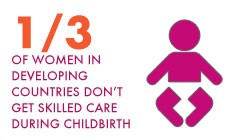
Geography: Global
Founded: 1993
Address:4455 Connecticut Avenue NW
Washington, DC 20008
Women for Women International provides women survivors of war, civil strife and other conflicts with the tools and resources needed to move from crisis and poverty into a civil society that promotes and protects peace, stability and self-sufficiency.
We envision a world where no one is abused, poor, illiterate or marginalized; where community members have full and equal participation in processes that ensure their health, well-being, and economic independence; and where everyone has the freedom to define the scope of their life, their future and to strive to achieve their full potential.
Women for Women International recognizes that lasting change can be achieved only through the combination of these two elements:
Access to knowledge + Access to resources = Lasting Social & Economic Change
Our 12-month education program provides women with financial and emotional support, rights awareness and job skills training. Over the course of their training, the women we serve achieve four outcomes:
- Women Sustain an Income. Women earn a minimum income of $1 a day.
-
Women are Well. Women have and are able to maintain the level of physical and psychological health necessary to actively participate in the family and community.
- Women are Decision Makers. Women contribute to decisions in the family and community.
-
Women Have Social Networks and Safety Nets. Women by themselves and in solidarity with others aid the cause of women by promoting and advocating shared needs and desires.
We believe that when the four key outcomes of our program are met, women experience lasting change and move from victim to survivor to active citizen. As active citizens, woman can become leaders of community change that lead to peaceful and stable societies.
Additionally, the one year program provides these tools and resources to the participants in the program:
- Direct financial assistance that can be used to pay for necessities like buying food, medicine and sending her children to school
- Prevention, treatment and management of critical health issues
- Rights awareness training to advocate on behalf of themselves, their families and their communities
- Support networks to share ideas, resources, information and help support and protect each other and solve problems collectively
- Vocational and business skills training
- Country-specific training that may include HIV/AIDS awareness and prevention and literacy training
